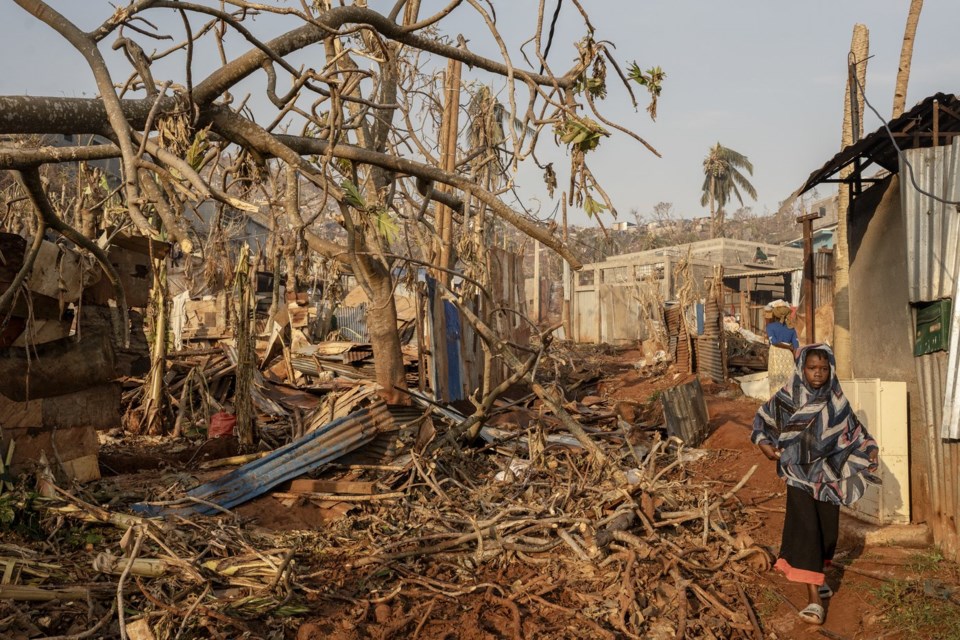MAMOUDZOU, Mayotte (AP) — A week after its worst cyclone in nearly a century, France’s impoverished is still grappling to count the dead, restore essential services and aid a beleaguered population. Already stretched thin, hospitals are overwhelmed with patients suffering not only from cyclone-related injuries but dehydration, malnutrition and disease.
At Mayotte’s main hospital in the capital, Mamoudzou, doctors face a cascade of crises.
“We lost 40% of patient rooms, about 50 to 60 beds,” said Dr. Roger Serhal, chief of the obstetrics and gynecology department. “There are so many patients coming to the hospital, and we don’t have space to admit them.” As Cyclone Chido battered the archipelago last weekend and 220 kph (136 mph) winds howled around the hospital, Serhal and his team delivered three babies, including by cesarean section.
The hospital’s structural damage has forced staff to triage patients, prioritizing the most severe cases.
Thirty-five people have been confirmed dead in Mayotte but French Health Minister Geneviève Darrieussecq has warned that any estimates were likely major undercounts “compared to the scale of the disaster.”
The storm has and many people had ignored warnings, thinking the storm wouldn’t be so extreme. Even worse, many migrants avoided shelters out of fear of deportation, authorities said, adding there could be of fatalities.
Doctors fear that the lack of clean water and electricity — compounded by overcrowded living conditions — is setting the stage for a health crisis.
“Patients are coming because their illnesses are untreated, there’s no water, and no electricity. We’re concerned about epidemics, like the cholera outbreak we stopped just months ago,” said Dr. Vincent Gilles, the hospital’s emergency medical director.
The hospital staff continues to work tirelessly, but resources are running dangerously low. “If we have rain,” Serhal added, “it will be catastrophic.”
Among the patients struggling to recover was Saindou Mohamadi, 54, who fractured his arm and sprained his ankle during the storm that left his home completely destroyed. Speaking from his hospital bed, Mohamadi expressed despair for his family.
“My mother is sick, I’m sick, and my child is sick,” he said. “They need to eat, but I’m the one who takes care of the food, and now we have nothing.” With six children to support, Mohamadi is among countless residents left homeless and destitute.
“I’m not alone,” he said. “There are many of us who have lost everything — our houses, our food. I want the government to care about us, to give us food and a place to sleep.”
Mayotte is a densely populated archipelago between Madagascar and the African continent of more than 320,000 people, but authorities have estimated another 100,000 migrants live there from as far away as Somalia.
long struggled with systemic neglect and underinvestment. Around 75% of its population lives in poverty, and the archipelago’s infrastructure was ill-equipped to withstand a disaster of this magnitude. Chido’s destruction has compounded these challenges, leaving many residents with little faith in the government’s ability to provide timely and adequate relief.
Efforts to deliver emergency aid, including airlifts of water and food, are underway but the scale of the need is staggering. Mayotte’s airport remains closed to civilian flights due to damage, further complicating logistics.
French President Emmanuel Macron, during his visit on Friday, acknowledged the gravity of the situation and pledged to rebuild but faced criticism from residents frustrated by the slow pace of aid.
France's Interior Ministry estimated that 70% of the population has been gravely affected, with many left homeless and vulnerable.
Sam Mednick, Adrienne Surprenant And Thomas Adamson, The Associated Press



